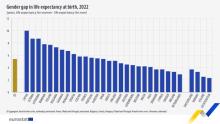Life expectancy
School life expectancy in Türkiye drops to 17.9 years in 2023: TÜİK
Türkiye's school life expectancy (SLE), the estimated amount of time that a primary school-aged person in Türkiye will likely spend in school until they reach their highest level of education, was calculated to be 17.9 years in 2023, data from the Turkish Statistical Institute (TÜİK) have shown.
Life expectancy rises in tune with educational attainment: TÜİK
Individuals with higher levels of education have longer life expectancies overall in the country, while life expectancy is shorter for those with lower levels of education, data from the Turkish Statistical Institute (TÜİK) showed.
Cancer cases rise, but new treatments help patients
Treatments increasingly tailored to individual cases will help boost cancer patients' longevity, ensure a better quality of life and reduce recurrence of cancers in remission, Dr Thanos Dimopoulos, a professor of blood and tumor diseases and former rector of the University of Athens, told Kathimerini in an interview.
Bulgaria's Grim Reality: One in Five Die Before 65
Average life expectancy in Europe is 81.5 years, with men living up to 78.9 years and women to 84.2 years. However, Bulgaria ranks at the bottom, with life expectancy significantly lower. The highest life expectancies are found in Liechtenstein and Switzerland, where people live an average of 6-7 years longer than Bulgarians.
- Read more about Bulgaria's Grim Reality: One in Five Die Before 65
- Log in to post comments
Bulgaria: Lowest Life Expectancy in Europe!
Life expectancy in Bulgaria has increased by a year and a half, according to the latest data from the National Institute of Statistics. This study compares the period 2021-2023 to 2020-2022. However, compared to ten years ago, there is a decline in average life expectancy for both women and men. City dwellers live more than three years longer than those in villages.
- Read more about Bulgaria: Lowest Life Expectancy in Europe!
- Log in to post comments
Bulgaria's Life Expectancy Rises but Lags Pre-Pandemic Levels
The National Statistical Institute (NSI) data reveals that the anticipated average life expectancy for Bulgaria's populace, projected for the period spanning 2021 to 2023, stands at 73.5 years. This marks a notable uptick of 1.6 years compared to the preceding timeframe of 2020 to 2022. However, it remains slightly below the pre-pandemic levels, surpassing 74 years.
More years of work, lower pensions
Today's teenagers, the children born during the debt crisis of the previous decade, who will enter the labor market around 2030, will be able to retire at the age of 72.5 having worked at least 38.5 years, according to the European Commission's 2024 Aging Report - Economic and Budgetary Projections for the EU Member-States 2022-2070.
- Read more about More years of work, lower pensions
- Log in to post comments
Surging nerve system disorders now top cause of illness: study
Conditions affecting the nervous system — such as strokes, migraines and dementia — have surged past heart disease to become the leading cause of ill health worldwide, a major new analysis said on Friday.
More than 3.4 billion people — 43 percent of the global population — experienced a neurological condition in 2021, far more than had previously been thought, the analysis found.
Bulgaria: 3 Regions With Lowest Life Expectancy - EU Report 2022
The most recent data from Eurostat, released on Thursday, indicates that in 2022, life expectancy at birth within the European Union is on an upward trajectory compared to the years preceding the pandemic. Nonetheless, it still falls short of the levels observed in 2019.
UN report: The gap between rich and poor countries has widened further in the aftermath of the pandemic
Life expectancy and living standards increased in wealthy countries









